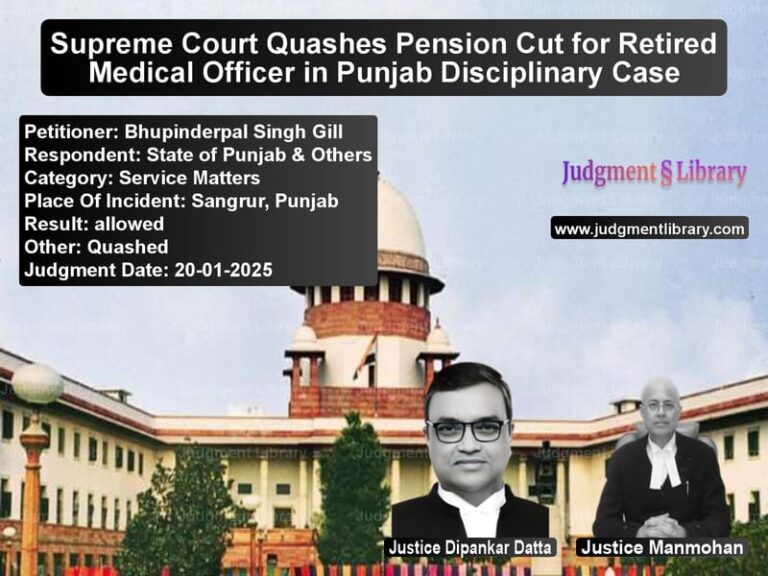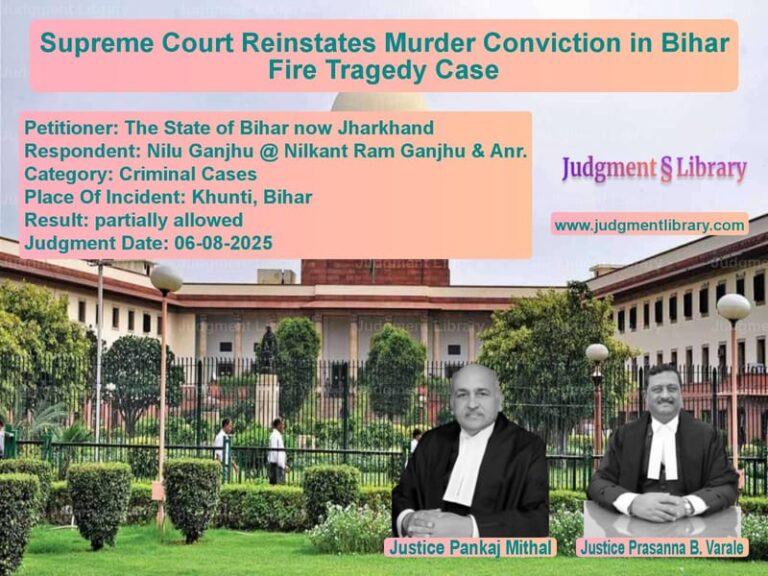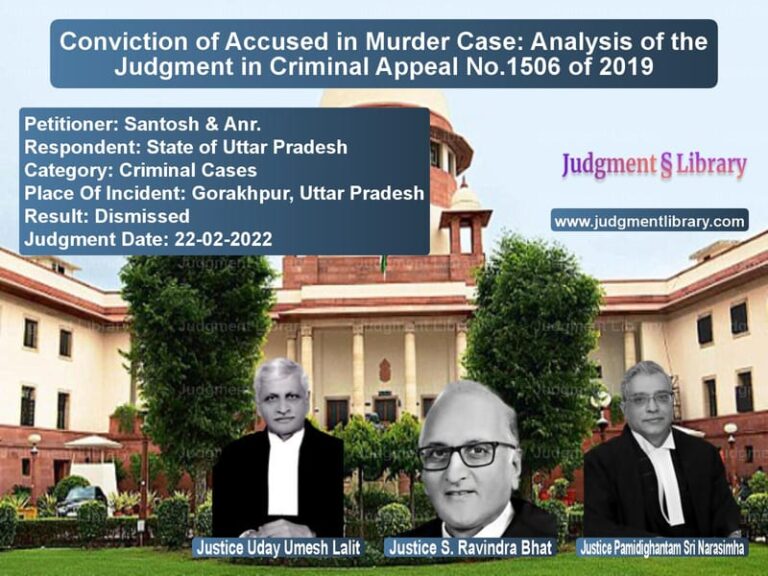Supreme Court Orders Reconsideration of CRPF Employee’s Termination for Criminal Case Suppression
The Supreme Court of India, in the case of Avtar Singh vs. Union of India & Ors., addressed an employment dispute related to the termination of a CRPF employee on the grounds of suppressing information regarding a past criminal case. The Court directed the appointing authority to reconsider the appellant’s case in light of the legal principles established in its earlier judgment.
Background of the Case
The appellant, Avtar Singh, was selected for appointment in the Central Reserve Police Force (CRPF) on August 24, 1994. At the time of his appointment, he was required to submit a verification form, which included a column asking whether he had ever been involved in a criminal case. The appellant left this column unfilled.
During a subsequent verification process, it was discovered that an FIR had been registered against him on October 28, 1992, under Sections 323, 324 read with Section 34 of the Indian Penal Code (IPC). While he had been acquitted of the charges on May 2, 1994, an appeal filed by the prosecution was still pending when his termination was ordered.
Legal Issues Considered
The Supreme Court examined several key legal questions in this case:
- Whether non-disclosure of past criminal cases in an employment verification form constitutes valid grounds for termination.
- Whether the appointing authority has discretion in deciding the impact of such suppression based on the nature of the offense.
- Whether the appellant’s acquittal and the pending appeal should have influenced the decision of termination.
Petitioner’s Arguments
The appellant, represented by his legal counsel, contended that:
- He had been acquitted before he filled out the verification form, and therefore, he did not consider it necessary to mention the past case.
- The suppression was not deliberate but an oversight, and he had no intent to mislead the authorities.
- The offense under Sections 323 and 324 IPC was not of a heinous nature, and terminating him for such a minor offense was disproportionate.
Respondent’s Arguments
The Union of India and CRPF, represented by its legal team, defended the termination, arguing that:
- The appellant had suppressed a material fact by not disclosing the criminal case against him.
- As a member of a disciplined force like CRPF, integrity and full disclosure were essential for service eligibility.
- The pending appeal against the acquittal indicated that the case had not yet reached finality, making his suppression even more significant.
Supreme Court’s Observations
The Supreme Court, led by Justices Kurian Joseph and R. Banumathi, referred to its earlier ruling in Avtar Singh vs. Union of India & Others (2016), which provided guidelines for dealing with cases of suppression of criminal antecedents in employment.
The key observations included:
- Employers have the discretion to assess the impact of suppression based on the nature of the offense and the circumstances of the case.
- Trivial offenses, especially those that would not render a person unfit for public service, may not justify termination solely on suppression grounds.
- If an acquittal is recorded on technical grounds and not based on a clean exoneration, the employer can still consider the antecedents.
- Suppression of multiple pending cases would indicate deliberate false information and justify termination.
- Employers should ensure that verification forms are clear in their requirements so that candidates do not inadvertently omit relevant details.
The Court emphasized:
“Before a person is held guilty of suppressio veri or suggestio falsi, knowledge of the fact must be attributable to him.”
Final Judgment
The Supreme Court ruled as follows:
- The appointing authority was directed to reconsider the appellant’s case in light of the legal principles established in Avtar Singh vs. Union of India & Others.
- The appellant was given the right to file a representation before the appointing authority, which was directed to pass a speaking order within four months.
- The appellant must be given an opportunity of hearing before a final decision is made.
- Pending applications in connection with the case were disposed of.
Implications of the Judgment
The ruling has significant implications for public sector employment and verification procedures:
1. Fairness in Employment Termination
The judgment ensures that termination decisions based on suppression of facts must be proportionate and not arbitrary.
2. Clarification of Disclosure Obligations
Employees must carefully fill out verification forms, and employers must ensure that forms are explicit in asking for specific information.
3. Discretionary Power of the Employer
Employers retain discretion in determining whether suppression is significant enough to justify termination, particularly in cases of trivial offenses.
4. Opportunity for Employees to Defend Themselves
The ruling reinforces that employees should be given an opportunity to explain their circumstances before adverse action is taken.
Conclusion
The Supreme Court’s decision in this case underscores the importance of fairness and proportionality in employment termination cases. By directing the appointing authority to reconsider the appellant’s case, the Court reaffirmed the principle that suppression of criminal antecedents should be judged on a case-by-case basis, considering the nature of the offense and the intent behind the omission.
Don’t miss out on the full details! Download the complete judgment in PDF format below and gain valuable insights instantly!
Download Judgment: Avtar Singh vs Union of India & Ors Supreme Court of India Judgment Dated 15-11-2017.pdf
Direct Downlaod Judgment: Direct downlaod this Judgment
See all petitions in Employment Disputes
See all petitions in Public Sector Employees
See all petitions in Disciplinary Proceedings
See all petitions in Judgment by Kurian Joseph
See all petitions in Judgment by R. Banumathi
See all petitions in Remanded
See all petitions in supreme court of India judgments November 2017
See all petitions in 2017 judgments
See all posts in Service Matters Category
See all allowed petitions in Service Matters Category
See all Dismissed petitions in Service Matters Category
See all partially allowed petitions in Service Matters Category







